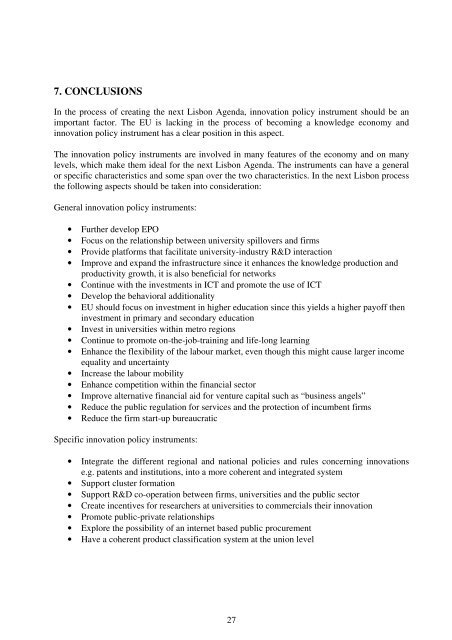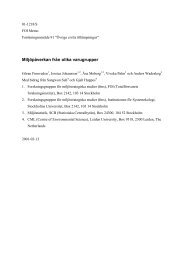INNOVATION POLICY INSTRUMENTS
INNOVATION POLICY INSTRUMENTS
INNOVATION POLICY INSTRUMENTS
Create successful ePaper yourself
Turn your PDF publications into a flip-book with our unique Google optimized e-Paper software.
7. CONCLUSIONS<br />
In the process of creating the next Lisbon Agenda, innovation policy instrument should be an<br />
important factor. The EU is lacking in the process of becoming a knowledge economy and<br />
innovation policy instrument has a clear position in this aspect.<br />
The innovation policy instruments are involved in many features of the economy and on many<br />
levels, which make them ideal for the next Lisbon Agenda. The instruments can have a general<br />
or specific characteristics and some span over the two characteristics. In the next Lisbon process<br />
the following aspects should be taken into consideration:<br />
General innovation policy instruments:<br />
• Further develop EPO<br />
• Focus on the relationship between university spillovers and firms<br />
• Provide platforms that facilitate university-industry R&D interaction<br />
• Improve and expand the infrastructure since it enhances the knowledge production and<br />
productivity growth, it is also beneficial for networks<br />
• Continue with the investments in ICT and promote the use of ICT<br />
• Develop the behavioral additionality<br />
• EU should focus on investment in higher education since this yields a higher payoff then<br />
investment in primary and secondary education<br />
• Invest in universities within metro regions<br />
• Continue to promote on-the-job-training and life-long learning<br />
• Enhance the flexibility of the labour market, even though this might cause larger income<br />
equality and uncertainty<br />
• Increase the labour mobility<br />
• Enhance competition within the financial sector<br />
• Improve alternative financial aid for venture capital such as “business angels”<br />
• Reduce the public regulation for services and the protection of incumbent firms<br />
• Reduce the firm start-up bureaucratic<br />
Specific innovation policy instruments:<br />
• Integrate the different regional and national policies and rules concerning innovations<br />
e.g. patents and institutions, into a more coherent and integrated system<br />
• Support cluster formation<br />
• Support R&D co-operation between firms, universities and the public sector<br />
• Create incentives for researchers at universities to commercials their innovation<br />
• Promote public-private relationships<br />
• Explore the possibility of an internet based public procurement<br />
• Have a coherent product classification system at the union level<br />
27
















